
The European Commission’s AI Watch (DG Connect and the Joint Research Centre) and the OECD AI Policy Observatory are holding a joint webinar on 22 June 2021 from 14:00 to 17:30 CET, open to all.
The European Commission (EC) and the OECD will present the findings of two reports that analyse national developments in artificial intelligence (AI) policies:
- European Commission AI Watch report “National Strategies on Artificial Intelligence: A European Perspective”
- OECD report “State of Implementation of the OECD AI Principles: Insights from National AI Policies”
The presentation of the reports will be followed by two panel discussions that examine how national AI policies are being implemented, as well as key trends and lessons learned. The panels will include representatives from the EC and the OECD, national policy makers and stakeholders from the private sector, civil society and academia.
The reports – main findings
The EC set up the AI Watch project to support for the implementation of the Coordinated Plan on AI, a joint initiative with the Member States. The EC's latest AI Watch report is part of an ongoing effort to monitor national AI strategies of EU Member States, Norway and Switzerland. The 2021 edition of the report provides the most recent update and suggests that national strategies focus on:
- Strengthening AI education and skills,
- Supporting research and innovation to drive AI developments into successful products and services,
- Improving collaboration and networking,
- Creating a regulatory framework to address ethical and legal issues, and
- Establishing a cutting-edge data ecosystem and ICT infrastructure.
Recent initiatives include efforts to tackle the COVID-19 pandemic and climate change.
The report also provides an overview of national competence centres in AI research and outlines policies to promote data access and sharing, as well as initiatives to stimulate the use of AI in public services. It also highlights policies on regulatory ‘sandboxes’, which allow for experimentation in real-life conditions while reducing barriers to test innovations.
The OECD report builds on the OECD AI Network of Experts' research, a working group on national AI Policies to identify challenges and good practices for the implementation of the five recommendations to policy makers contained in the OECD AI Principles. Over the past year, the group has focused on the practical implementation of AI policies throughout the following AI policy cycle: design, implementation, intelligence, and approaches for international and multi-stakeholder co-operation on AI policy.
A joint online database
The two reports leverage the joint EC-OECD database of national AI policies and strategies. The database contains over 650 AI policies and strategies from over 60 countries and the European Union. In 2021, the database was expanded to include emerging trends in AI policy, use cases in the public sector, COVID-19 responses that include AI and policies to foster AI skills and talent.
Related Content
Webinar: National AI strategies in Europe
AI Watch - National strategies on Artificial Intelligence: A European perspective, 2021 edition
AI Watch knowledge service
Details
- Publication date
- 21 June 2021
